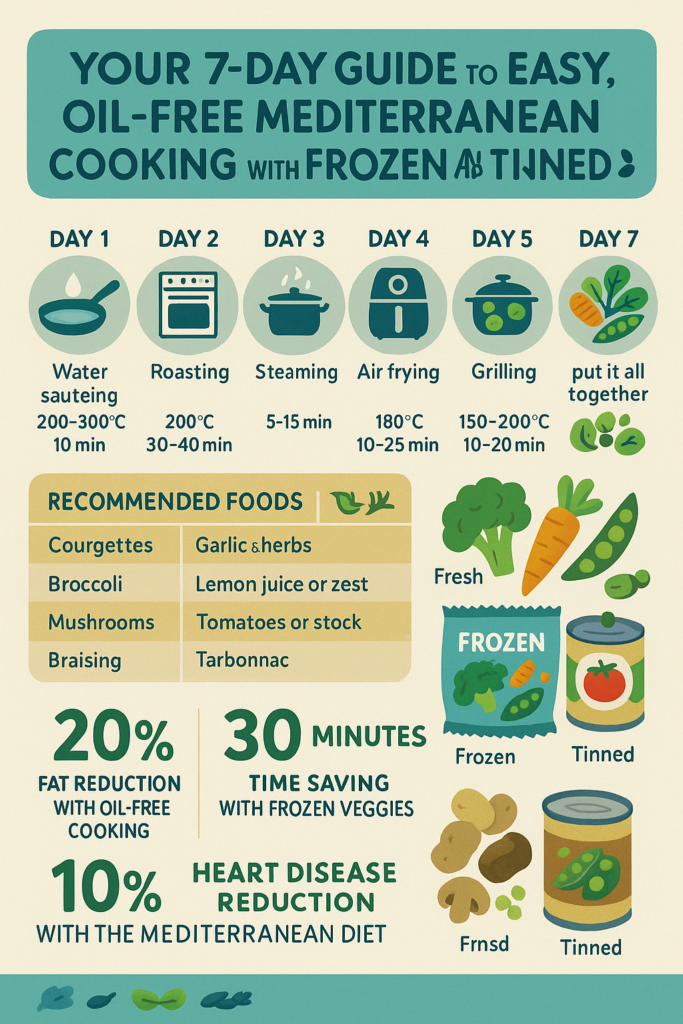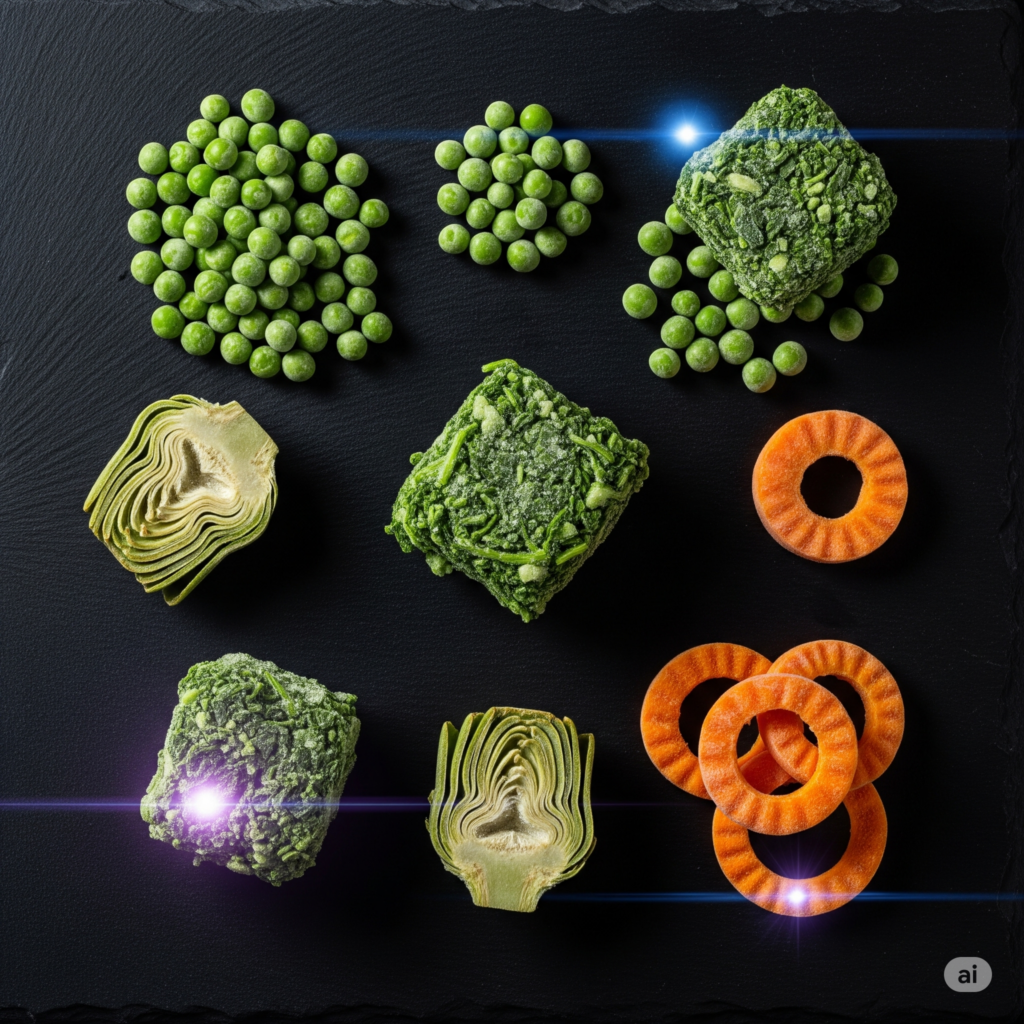Right, let’s talk about one of the biggest Mediterranean diet myths I encounter: the idea that absolutely everything has to be fresh. It’s a lovely thought, but let’s be honest, is it really practical in our busy lives?
- Frozen veg is your secret weapon for easy, nutritious meals.
- Forget the guilt; frozen is often *more* nutrient-packed than “fresh”.
- Tinned foods are your pantry heroes, especially tomatoes and beans.
- I’ll show you how to make the Med diet work *for you*, no stress involved.
- Ready to simplify your healthy eating? Let’s dive in!
Quotables
- Switching to oil-free cooking can reduce your daily fat intake by up to 20%.
- Frozen veggies can save you 30 minutes of prep time on a busy weeknight.
- Studies show the Mediterranean diet can reduce your risk of heart disease by 10%.
Picture the Mediterranean lifestyle. What do you see? I’m willing to bet it involves someone, probably named Sofia or Matteo, strolling through a sun-drenched market, filling a wicker basket with gleaming fresh vegetables. It\’s a beautiful image, isn\’t it? The Mediterranean diet is a wonderfully balanced way of eating, but sometimes the emphasis on “fresh” can be a bit misleading.
Now, picture this: It’s a rainy Tuesday evening in Britain. You’re tired after a long day, the fridge is looking a bit bare, and the idea of popping to the supermarket feels like climbing a mountain. You open the freezer and see a bag of frozen peas. A little voice whispers, \”Is this cheating? Is this even allowed on the Mediterranean diet?\” If you’ve ever felt that twinge of guilt, you’re not alone. This “purist” mindset can make a healthy lifestyle feel inaccessible. I know because I used to struggle with it, too. This article is for you. Let’s unpack why it is okay to use frozen or tinned ingredients and how you can benefit from them. Read more on the EatTricks blog.
The “Fresh is Best” Myth: Why We Feel Guilty
Let\’s be honest, we’re bombarded with marketing that screams \”fresh is best!\” We’re made to feel that anything less than farm-to-table is a compromise. And while fresh, local, seasonal produce is undeniably one of life\’s great joys and a cornerstone of the Med diet, making it the only option is a privilege not everyone has. It can be expensive, time-consuming, and, as we all know, can lead to a lot of food waste. Avoid common mistakes when adapting the Mediterranean Diet in the UK by understanding the role of frozen and canned foods.
This “purist” mindset can make a healthy lifestyle feel inaccessible and stressful. Eating healthily doesn’t have to be expensive or difficult. But what if I told you that your freezer could be your greatest ally?
My “Wilted Spinach” Moment of Truth
I used to be a purist, too. Every Sunday, I’d buy two enormous bags of beautiful, fresh spinach with the best of intentions. I’d use a handful on Monday and another on Tuesday. By Thursday, I’d be faced with a bag of sad, slimy, green mush at the bottom of my fridge, destined for the compost bin. It was a weekly ritual of wasted food and money.
My moment of truth came when I realised the answer was staring me in the face every time I opened my freezer. The block of frozen spinach wasn\’t a lazy compromise; it was a smart, efficient, and equally nutritious solution. My freezer wasn\’t a place of shame; it was a key to consistency. That’s when I started experimenting with frozen vegetables and, you know, it was actually quite liberating!
The Surprising Science: Why Frozen Can Be Better
Here\’s the bit of science that turns this myth on its head. Most frozen vegetables are picked at their absolute peak of ripeness and \”flash-frozen\” within hours. This process is like pressing a pause button, locking in all the vitamins and minerals at their highest levels. A 2017 study in the Journal of Food Composition and Analysis found that frozen produce often has comparable or even greater nutrient retention than fresh.
Now, think about the journey of \”fresh\” vegetables. They might be picked early, spend days or even weeks in transport and storage, and then sit on a supermarket shelf before they even make it to your kitchen. Throughout that long journey, their nutritional value can slowly decline. For certain vegetables—like peas, sweetcorn, and spinach—the frozen version you buy is often demonstrably more nutrient-dense than the \”fresh\” equivalent you\’ll find in the shop. Research supports this, showing that frozen vegetables can be a valuable source of nutrients.
Methods & Evidence — An Observation Plan
Here’s a simple 7-day plan I’ve developed to help you master oil-free Mediterranean cooking. Each day focuses on one technique, building your confidence gradually. It’s a fun way to explore these versatile cooking methods.
- Day 1 (Monday): Practice water sautéing with onions and garlic. Aim for 10-15 minutes cooking time.
- Day 2 (Tuesday): Try roasting vegetables at 200°C for 25-35 minutes until golden.
- Day 3 (Wednesday): Steam green vegetables for 4-6 minutes, then finish with lemon.
- Day 4 (Thursday): Use your air fryer at 180°C for 12-18 minutes for crispy results.
- Day 5 (Friday): Braise lentils or beans for 30-45 minutes until tender.
- Day 6 (Saturday): Grill vegetables on high heat for 3-5 minutes per side.
- Day 7 (Sunday): Combine techniques for a complete oil-free Mediterranean feast.
Illustrative Teaching Table
| Technique | Temperature Range | Typical Time | Best Foods | Flavour Tip |
|---|---|---|---|---|
| Water Sauté | Medium heat | 10-15 mins | Onions, garlic | Add splash of wine |
| Roasting | 200-220°C | 25-35 mins | Root veg, peppers | Balsamic finish |
| Steaming | 100°C | 4-8 mins | Greens, broccoli | Lemon & herbs |
| Air Frying | 180-200°C | 12-18 mins | Potatoes, tofu | Spritz with citrus |
| Braising | 160-180°C | 30-60 mins | Beans, lentils | Fresh herbs at end |
| Grilling | High heat | 3-5 mins/side | Aubergine, mushrooms | Marinate first |
| Non-stick | Medium-low | 5-10 mins | Eggs, fish | Build aromatics |

The 5 Best Frozen Vegetables for Your Mediterranean Kitchen
So, what should you stock up on? I’ve got a few favourites I always keep on hand. Think of these as your freezer powerhouses:
- Peas: An absolute hero. Sweet, full of fibre, and perfect for stirring into stews, pasta dishes, and rice, or simply served as a side with a bit of mint and olive oil. Pasta can absolutely be part of a balanced Mediterranean diet. Try adding some protein like lean chicken or fish for a complete meal.
- Spinach: A game-changer. Forget washing and wilting mountains of fresh stuff. Keep pre-portioned blocks or pellets on hand to drop into sauces, soups, omelettes, and stews for an instant iron and vitamin boost.
- Broad Beans (Fava Beans): A true Mediterranean staple that can be tricky to find fresh. The frozen version is brilliant for adding to salads (once thawed) or mashing with garlic, lemon, and olive oil to make a delicious dip. Creating creamy salad dressings is easy when you know how!
- Artichoke Hearts: A gourmet ingredient that costs a fortune when fresh and prepared. Frozen artichoke hearts are an affordable luxury, perfect for scattering on a pizza, adding to a salad, or stirring through a pasta sauce.
- The \”Soffritto\” Mix: This is my top time-saving secret! A pre-chopped mix of onions, carrots, and celery is the flavour base (known as soffritto in Italy) for countless Mediterranean dishes. Mastering soffritto can really elevate your cooking. Having this in your freezer means you can start a soup, stew, or sauce in seconds. Honestly, I wouldn’t be without it! Try it out in some quick 15-minute skillet meals.
Are Tinned Vegetables Okay, Too?
Absolutely! Your pantry is just as important as your freezer. Tinned beans and legumes—like chickpeas, lentils, and cannellini beans—are also essential for adding cheap, healthy, plant-based protein to meals in a flash. The key is to look for options with no added salt or sugar. Tinned chopped tomatoes are the non-negotiable bedrock of a Mediterranean kitchen. They’re just so versatile.
Sources
- British Heart Foundation – Mediterranean Diet Guidelines
- NHS Live Well – Healthy Eating Recommendations
- GOV.UK Food Standards Agency – Cooking Methods
Note: The cooking times and temperatures provided are educational examples only. Always adjust based on your specific equipment and ingredients.
So, let\’s go back to that rainy Tuesday. Reaching for that bag of frozen peas isn\’t failure; it\’s a victory. It\’s a sign of a smart, practical cook who knows how to eat well, save money, and reduce food waste. A freezer stocked with vegetables is your secret weapon for making the Mediterranean diet a sustainable, stress-free, and delicious part of your real life. Getting started with the Mediterranean diet is easier than you think! Discover simple swaps to adapt your favourite UK meals.
Ready to stock your freezer with confidence?
To help you out, I’ve created a \”Printable Freezer Essentials Checklist\” for the Modern Mediterranean Kitchen. It lists the top 15 frozen and tinned staples to always have on hand so you can whip up a healthy meal in minutes. Click here to download it for free!
Frequently Asked Questions (FAQs)
Is frozen fruit as good as fresh?
I get asked this a lot. Honestly, just like with veg, frozen fruit can be a brilliant option. It’s picked ripe and frozen quickly, so the nutrients are locked in. I love having berries in the freezer for smoothies or a quick crumble.
Can I use frozen veg in any recipe?
Most of the time, yes! I often swap frozen for fresh in stews, curries, and sauces. Just remember, frozen veg already has some water content, so you might need to adjust cooking times a bit. A little experimentation is key.
What about tinned fish? Is that a good Mediterranean option?
Tinned oily fish, like salmon, tuna, and sardines, are brilliant. They’re packed with Omega-3s and super convenient. I often add them to salads or pasta dishes for a quick protein boost. Just check the labels for added salt and sugar.
Any tips for making frozen veg taste its best?
My top tip? Don’t overcook it! Because it’s already partially cooked during the freezing process, you don’t need to cook it for as long as fresh veg. A little seasoning goes a long way, too. I love adding a squeeze of lemon or some fresh herbs at the end.
—
